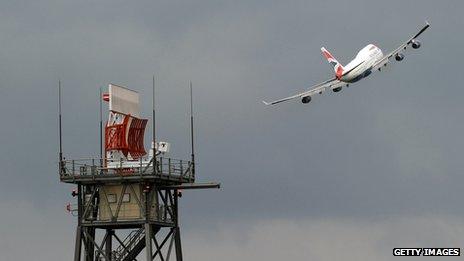Heathrow warns of investment threat
- Published
- comments

As the chancellor prepares to announce tomorrow a modest shift of public expenditure away from current spending towards capital projects, a business unusual for the scale of its infrastructure investments is threatening to pull the plug.
Heathrow, which has invested £11bn in improving its airport terminals and facilities over the past decade, is today telling its regulator that plans to cut its allowable return would make future plans to invest £3bn "economically irrational".
The background is that the Civil Aviation Authority (CAA) has calculated that Heathrow's "weighted average cost of capital" or WACC has fallen from mid 2009 by 2.4 percentage points to 5.35% before tax.
This sets the return or profit that Heathrow will be permitted to make from what it charges airlines and customers for five years from April 2014.
The view of Heathrow's management, in its response submitted to the CAA today, is that its shareholders won't put up the money for future necessary investment on that level of allowable return.
However, as you would probably expect, the airlines take a different view - and got their revenge in early, at the weekend.
They say that price rises for them implied by the proposed new allowable return - an annual increase of inflation minus 1.3% - would "harm passengers".
They believe that charges could be capped at inflation (RPI) minus 9.8% without undermining Heathrow's investment plans.
It is a classic and predictable row involving a regulated business.
But it has important economic consequences, partly because, as the IMF has pointed out, most infrastructure spending has a high impact on current and future economic growth, and - perhaps more importantly - Heathrow's role as a "hub" airport has disproportionate importance for the UK's prosperity (especially the prosperity of the south).
The dispute almost certainly means none of this will be settled quickly: an eventual appeal to the competition authorities looks more than likely.
Also it is an added complication for the Davies review into where and whether new runways should be built in the south, since Heathrow's executives believe their owners would have no interest in financing new runways on the proposed level of allowable return.
At the heart of the dispute between Heathrow and the CAA is the extent to which Heathrow is subject to risk and competition.
It is patently a very stable business compared to many. It does face competition, domestically and abroad, but pretty muted competition.
However shocks to its business do occur, whether from ash clouds above Iceland, or fears of pandemics being spread by travel.
So the question is whether the CAA is correct to set the allowable return several percentage points below what airports in Rome, Frankfurt and Paris can generate.
Also, the CAA is in effect saying, with its cost of capital calculation, that Heathrow is as safe and stable as the National Grid and Network Rail - which Heathrow disputes.
There is a wider implication for the UK's inward investment prospects from this dispute too.
In recent years, Heathrow's owners - led by Ferrovial of Spain - have made no money at all, largely because of regulatory intervention.
That regulatory intervention has probably benefited the British economy, because prices for customers have been held down, while the airport has continued to invest significant sums in improving and expanding capacity.
But there will come a moment when the owners of Heathrow tire of waiting for jam tomorrow.
Those owners include the sovereign wealth funds of China, Singapore and Qatar (CIC, GIC and Quatar holdings), which collectively own 40% of Heathrow.
As it happens, the British government hopes this immensely deep-pocketed trio of investors will be persuaded to back the modernisation of Britain's economy and infrastructure in other important ways.
Though, to coin a City phrase, if they feel done in by the airports regulator, they are unlikely to have a nice warm feeling about investing their wonga anywhere else where regulators or the government can determine their profits.